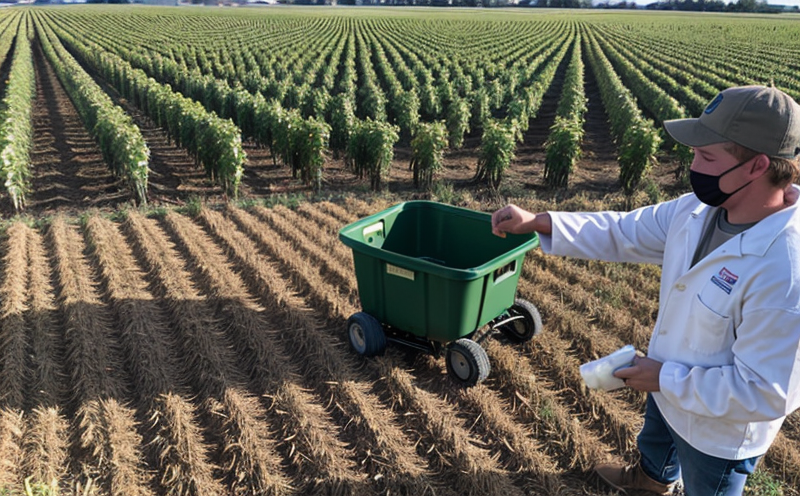Vitamin Content Testing in Fruits & Vegetables
The importance of vitamin content testing in fruits and vegetables cannot be overstated. Vitamins play a crucial role in supporting human health by providing essential nutrients that are necessary for various bodily functions, including immune system support, bone growth, and energy production.
Vitamin content testing is particularly vital post-harvest when the quality and nutritional value of produce begin to decline over time due to factors such as respiration, ethylene production, and microbial activity. The goal of this service is to ensure that fruits and vegetables retain their optimal vitamin levels throughout distribution and consumption.
Accurate vitamin content testing helps in maintaining product integrity and ensuring compliance with international standards like ISO 18036:2015 for vitamin C analysis or AOAC International methods for other vitamins. Compliance officers can rely on this service to meet regulatory requirements, while R&D engineers use it to enhance the nutritional profile of their products.
For quality managers and procurement personnel, accurate testing is essential in sourcing high-quality produce that meets not only flavor and texture standards but also nutritional benchmarks. This ensures that consumers receive wholesome food items rich in vitamins, thereby contributing positively to public health.
The process involves several key steps: sample preparation, extraction of vitamins, quantification using spectroscopic or chromatographic techniques, and finally reporting the results against defined acceptance criteria. Our state-of-the-art laboratories employ advanced analytical equipment such as high-performance liquid chromatography (HPLC) and ultraviolet-visible spectrophotometry (UV-Vis), which are capable of detecting even trace amounts of vitamins.
Our expertise in this area allows us to offer precise, reliable results that can guide decision-making processes across the supply chain—from farm to fork. By leveraging our services, businesses can enhance their reputation as leaders in providing nutritious produce while ensuring they remain compliant with relevant regulations.
- Compliance: Ensures adherence to international standards and local legislation.
- Quality Assurance: Maintains consistent vitamin levels throughout the supply chain.
In summary, vitamin content testing in fruits and vegetables is a critical component of ensuring product quality and nutritional integrity. Through our sophisticated analytical methods and commitment to precision, Eurolab provides unparalleled support for businesses operating within this sector.
Why It Matters
The significance of maintaining accurate vitamin content in fruits and vegetables extends beyond mere compliance; it has profound implications for public health. Vitamins are essential micronutrients that contribute to overall well-being, making their presence in food items a matter of public interest.
When fruits and vegetables are harvested, they undergo natural processes such as respiration, which leads to the breakdown of vitamin C (ascorbic acid) and other water-soluble vitamins. This degradation can occur rapidly if proper handling practices aren't followed. Ensuring that these vital nutrients remain intact is crucial for maintaining the health benefits associated with consuming fresh produce.
For instance, a study published in the Journal of Agricultural and Food Chemistry found that improper storage conditions could reduce vitamin C levels by up to 50% within just two days post-harvest. Such reductions have direct implications for consumer health, potentially leading to deficiencies if not addressed.
In addition to preventing nutrient depletion, accurate testing helps in optimizing production practices. By identifying which stages of the supply chain are causing the most significant losses, farmers and processors can implement targeted interventions aimed at preserving vitamin content throughout the entire process.
From a regulatory perspective, ensuring adequate vitamin levels is not only beneficial for consumers but also aligns with global efforts to combat malnutrition. According to the World Health Organization (WHO), deficiencies in certain vitamins are linked to various diseases and health conditions worldwide.
- Consumer Trust: Accurate testing builds confidence among consumers regarding the nutritional value of purchased products.
- Sustainability: By minimizing vitamin losses, we contribute towards more sustainable agricultural practices.
In conclusion, vitamin content testing is indispensable in safeguarding public health and promoting responsible agricultural practices. Our service plays a pivotal role in achieving these goals through rigorous analysis and actionable insights.
Eurolab Advantages
At Eurolab, we pride ourselves on delivering unparalleled quality and reliability in all our services, including vitamin content testing for fruits and vegetables. With decades of experience and cutting-edge technology at our disposal, we offer several unique advantages that set us apart from competitors:
- State-of-the-Art Facilities: Equipped with the latest instrumentation such as HPLC and UV-Vis spectrophotometry.
- Expertise in Analytical Chemistry: Our team comprises highly skilled chemists specializing in food analysis.
- Comprehensive Reporting: Detailed reports aligned with international standards like ISO 18036:2015 and AOAC International methods.
- Custom Solutions: Tailored testing packages designed specifically for individual client needs.
We understand that every business has unique requirements when it comes to vitamin content testing. That’s why we offer flexible options that cater to diverse operational scales and budgets. Our commitment to excellence ensures that our clients receive not only accurate results but also valuable recommendations aimed at improving product quality and nutritional value.
Moreover, Eurolab is dedicated to fostering long-term relationships with our customers by providing ongoing support and assistance whenever needed. Whether it's troubleshooting issues during testing or offering guidance on best practices for preserving vitamin content post-harvest, we are here to help every step of the way.





